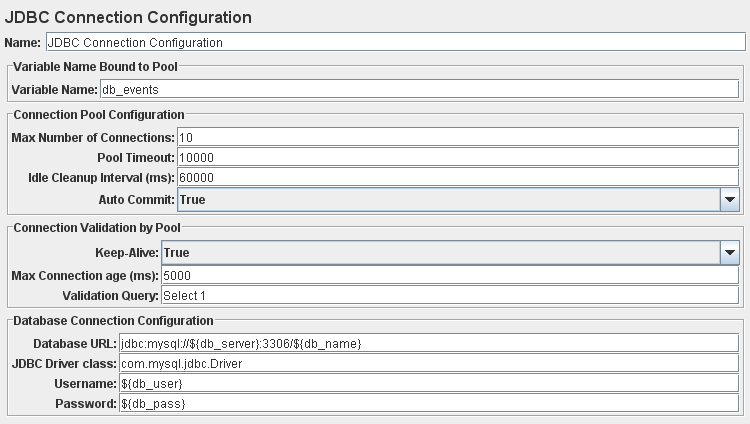JMeter Advanced: Difference between revisions
Jump to navigation
Jump to search
Cesar Chew (talk | contribs) No edit summary |
(No difference)
|
Latest revision as of 16:49, 24 November 2014
Transaction Controller
- Allows to aggregate results for many samplers
- Useful for Ajax
- Can be used as an alternative for downloading embedded elements
Sachin garg 9871702532
Connecting to a Database
- Added MySQL JDBC driver: http://dev.mysql.com/downloads/connector/j/5.1.html
- Copy the appropriate .jar file to the “lib” directory of your JMeter installation
Setting up a connection
Extracting data from SQL result
- This example takes tab separated data returned by a database call and adds it to db_rows
- Note the -1, which when combined with a ForEach Logic Controller processes all rows
Extracting Multiple Values
Pattern
name="file.name" value="readme.txt"
Reference Name:
MYREF
Regex:
name="(.+?)" value="(.+?)"
Template:
$1$$2$
The following variables would be set:
MYREF: file.namereadme.txt
MYREF_g0: name="file.name" value="readme.txt"
MYREF_g1: file.name
MYREF_g2: readme.txt
${MYREF}, ${MYREF_g1} etc
Using Beanshell
- BeanShell interpreter: http://www.beanshell.org/download.html
- BeanShell is one of scripting languages available within JMeter
- With BeanShell you can create custom outputs, perform logical operations, manipulate variables, etc.
Simple BeanShell Example
- In this BeanShell example having gathered the last known user ID from a user table with a JDBC Request and putting it in a variable with a Regex Extractor, this is used to calculate what the next two user ID's will be with BeanShell:
- Note ${lastid} is passed in using the Parameters box, but this is not necessary – you can also use vars.get(“lastid”) from within the script itself
- Anything passed in to a BeanShell Sampler using the Parameters field is held in the Parameters variable
BeanShell Inline
- You can run snippets of BeanShell wherever by taking advantage of JMeter BeanShell function. The syntax is:
${__BeanShell(code here as escaped string)}
- E.g. setting a variable:
${__BeanShell(vars.put(“name”\,”value”))}
- Note the “slash” before the comma – special characters must be escaped within the __BeanShell function
BeanShell Inclusion
- You may also call external BeanShell scripts, like this example from the JMeter manual:
${__BeanShell(source("function.bsh"))}
- The above line invokes the BeanShell script in the file “function.bsh”
- The __BeanShell function (like all JMeter functions) can be invoked anywhere you can normally use a variable
ForEach Logical Controller
- Amongst its many uses, this can be used, in conjunction with a JDBC Request, to cycle through all the rows returned from a database select query:
- The input variable must match the reference name in your Regex Extractor for the sampler
- Output variable is the data for the specific row
Manipulating data with BeanShell
- Within a ForEach controller, use a BeanShell Sampler to load, format and output each row of the database result
- Don't forget your BeanShell Sampler must be nested under the ForEach controller to be affected by it – otherwise it will only execute once on the final value
JMeter Calculating Frequencies
// noOfThreads1 = Integer.parseInt(Parameters);
noOfThreads1 = Integer.parseInt(vars.get("NT_ANON"));
noOfThreads1 = noOfThreads1 * 2;
vars.put("NT_ANON",noOfThreads1.toString());
Functions
- ${__time(yyyyMMdd-HHmmss ,TIME)}
Extras
- Markov4JMeter
- Plugins (Sampler)




